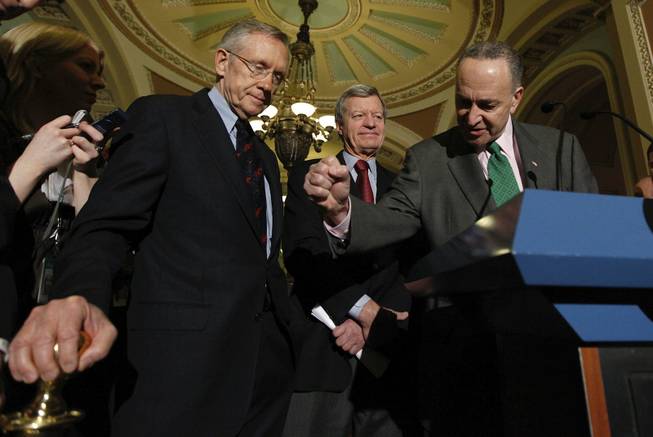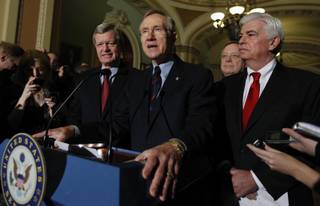
Manuel Balce Ceneta / AP
Senate Majority Leader Harry Reid of Nevada, left, listens as Sen. Charles Schumer, D-N.Y., right, drives home a point while answering questions on Capitol Hill in Washington, Thursday, Dec. 24, 2009, after the Senate passed the health care reform bill. Senate Finance Committee Chairman Sen. Max Baucus, D-Mont., is at center.
Friday, Dec. 25, 2009 | 2 a.m.
Sun Coverage
- Senate casts historic vote on health care reform (12-24-09)
- Harry Reid casts ‘no’ vote as joke — maybe (12-24-09)
- How Reid handled health care (12-24-09)
- Road to health care reform still has obstacles (12-24-09)
- Senate clears a final procedural hurdle to health care reform (12-23-09)
- Health coverage requirement raises constitutionality debate (12-23-09)
- Reid bobs and weaves to land health care deal (12-22-09)
- GOP to keep up its fight until the final deadline (12-22-09)
- Deal-making gets job done, Reid says (12-22-09)
- Obama welcomes ‘historic’ health care advance (12-21-09)
- Jim Gibbons attacks Harry Reid on health care bill (12-21-09)
- Health care bill clears tough Senate test (12-20-2009)
- Health care compromise gives sweet Medicaid deal to Nebraska (12-20-2009)
Senate Majority Leader Harry Reid could not sleep.
It was the night before the final Senate vote on the health care bill. The heavy lifting of assembling 60 votes was done. Only a simple majority was needed.
But that fact did not give the Nevada Democrat any peace.
He woke at midnight and every hour until just before 5 a.m., when he climbed out of bed to get ready for work. The vote was scheduled for 7 a.m.
“I was just anxious,” Reid said later.
Nothing has been easy in the long health care debate of 2009, and it would not be easy even as a key chapter drew to a close Thursday.
Tension filled the chamber as senators filed in and took their seats in the predawn hours of Christmas Eve. The visitors’ galleries filled.
The debate was brief and polarizing, as politically divisive as it had been for the five months the legislation had been in the spotlight.
Republicans stood unified against the bill, and Sen. Mitch McConnell of Kentucky, the Republican leader, vowed to continue blocking the bill he believes does not have popular support.
“This fight isn’t over,” McConnell said, deriding the vote that was about to unfold. “We’re left with party-line votes in the middle of the night, a couple of sweetheart deals to get it over the finish line and a public that’s outraged.”
Reid returned to the story of Caleb, the high school student in Sparks who has outgrown his prosthetic legs, but has been denied new ones by his insurance company.
“How much longer can we afford to put this off?” Reid said. “We may not completely cure this crisis today or tomorrow, but we must start toward that end. Our charge is to move forward.”
Health care reform had been sought by seven administrations, and it mostly eluded them. With the Senate working 25 consecutive days on the bill, and a House version approved, the endgame is in sight for President Barack Obama’s top domestic policy.
Reid struggled for months to craft the compromises that had brought the bill to the first Christmas Eve vote since 1895.
Critics have second-guessed him at every step. Liberals derided Reid for dropping the longed-for public option. Opponents complained about deals worth more that $1 billion that he cut to ply reluctant Democratic senators with home-state pork to win their support.
At points along the way, consensus seemed out of reach.
But Democrats held together, overcoming a series of procedural votes that began Nov. 30 to advance the legislation and beat back Republican attempts to kill the bill.
As the vote began Thursday morning, the hard part was over.
Democratic Sen. Robert Byrd of West Virginia, 92, who uses a wheelchair, broke protocol to deliver a message with his vote.
“This is for my friend, Ted Kennedy,” the senator said, a finger raised in the air as he cast his vote. “Aye!”
In the gallery was Victoria Reggie Kennedy, widow of Sen. Ted Kennedy of Massachusetts, who died this year after a career spent working on health care reform. Also in the galleries were White House officials and 83-year-old Democratic Rep. John Dingell of Michigan, whose father introduced the first health care reform bill generations ago.
As the roll call neared Reid’s name, the majority leader stood at his desk, prepared to deliver his vote.
“Mr. Reid of Nevada,” the clerk called.
“No,” Reid said.
Gasps filled the chamber.
“I mean aye,” Reid quickly said.
The majority leader sat down and buried his head in his arms on his desk. He looked up, hands upturned, and shrugged. He smiled in apology. He folded his hands in a triangle, elbows on his desk, and rested his head.
The chamber erupted in laughter.
Reid joked about it afterward, saying he was trying to create a sense of bipartisanship.
But later Reid told the Sun he was caught up in his thoughts.
“I was just sitting there thinking about everything,” Reid said. “Just thinking about what we’d been through.”
Reid tried to laugh it off. “I thought it was time to create a little break of the tension.”
But it did not appear intentional.
“Well, maybe it wasn’t,” Reid confided. “I just wasn’t thinking.”
Obama called Reid afterward to tell the majority leader he was proud of him, an aide familiar with the conversation said.
The bill must be merged with the House version, a potentially difficult process as the two chambers take starkly different approaches to key provisions.
Both bills would require that all Americans carry health insurance by 2014, and those who decline coverage will be fined. Subsidies would be offered to low- and middle-income families so they could afford it. An estimated 30 million uninsured Americans would be covered.
The bills would launch industry reforms, including banning insurance companies from denying coverage for pre-existing conditions and requiring most of their income be put toward care, rather than profits.
The House bill contains the public option, which was cut from the Senate bill to appease moderate senators. In its place in the Senate’s version is a new menu of private insurance choices for the uninsured, overseen by the federal government — much the way members of Congress shop for insurance.
The Senate version would cost $871 billion over the next decade, primarily to pay for the subsidies. Both bills raise money for subsidies by taxing the insurance industry, pharmaceutical companies and medical-device manufacturers.
The House bill taxes those making more than $500,000 annually ($1 million for couples) while the Senate bill taxes high-end insurance plans and high-wage earners — those making more than $200,000 a year or $250,000 for couples.
At the White House, Obama praised the vote, which along with the House-passed bill, “brings us toward the end of a nearly centurylong struggle to reform America’s health care system.”
Polls are mixed, with voters saying they are displeased with the legislation but those in Nevada saying they want health care reform.
Democrats think voters will view the legislation more favorably once they learn about its provisions. Republicans think voter opinion will deteriorate more.
Every Republican voted no except Sen. Jim Bunning of Kentucky, who was absent after missing several of the week’s votes on health care.
Republican Sen. John Ensign of Nevada voted against the bill, which he thinks will lead to higher insurance costs and undue government intrusion in the health care industry. Ensign lost a vote earlier this week to declare the bill unconstitutional — a battle that opponents will likely take to the courts.
Nevada’s Republican Gov. Jim Gibbons said the bill’s proposed expansion of Medicaid, the federally financed, state-run health program for children and poor people, will be a financial hardship on the state. Gibbons called the bill “a knife in our backs.”
The roll call was nearly finished by 7:15 a.m., but one seat on the Democratic side was empty. In rushed Sen. Bernard Sanders, an Independent from Vermont, who flashed a thumbs up to the clerk. He took his place behind his desk and voted “yes.”
Reid had his 60th vote, needed or not.
“The corridors of the Senate are filled with portraits and statues of political leaders,” said Sen. Richard Durbin of Illinois, the majority whip.
“But I will tell you, the contribution to this nation made by the senator from Searchlight, Nevada, will become one of the shining chapters in the history of the United States Senate and our nation,” Durbin said. “He achieved what others have failed ... to achieve. And he did it with the tenacity and the strength and the determination that I’ve never seen in my time.”
Nancy-Ann DeParle, the White House’s health policy director, watched the vote from the gallery.
“Health care in our country is going to be defined by three Harrys: Harry Truman, Harry and Louise, and the big guy — the majority leader,” DeParle told the Sun. She was referring to the Truman administration’s health reform push and the insurance industry TV ads that doomed the Clinton administration effort.
Reid, she said, had brought the Senate to this point.
“He drove this and he got it done,” DeParle said. “I don’t think anyone else could have done this.”


Join the Discussion:
Check this out for a full explanation of our conversion to the LiveFyre commenting system and instructions on how to sign up for an account.
Full comments policy